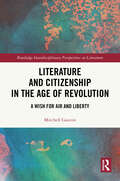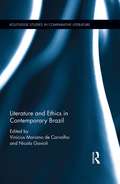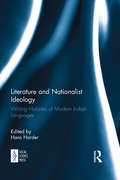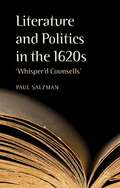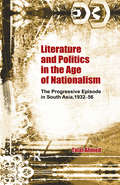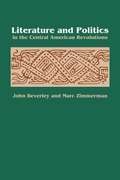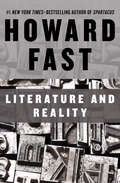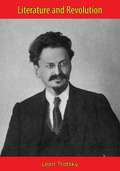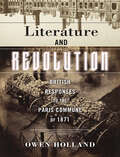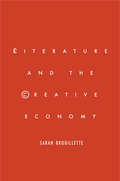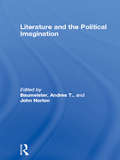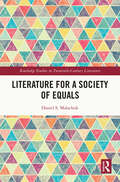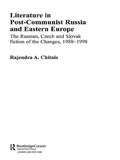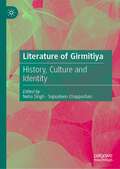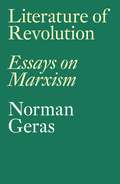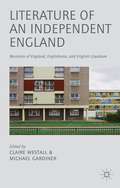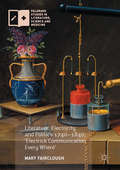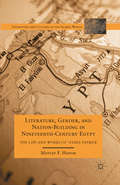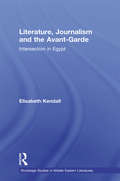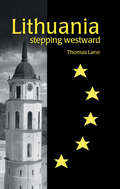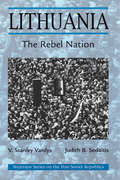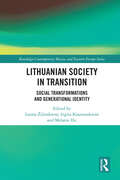- Table View
- List View
Literature and Citizenship in the Age of Revolution: A Wish for Air and Liberty (Routledge Interdisciplinary Perspectives on Literature)
by Mitchell GauvinCitizenship is at the forefront of popular imagination as political movements and state governments around the world traffic in anti-immigrant rhetoric and call for increased policing of borders. Literature and Citizenship in the Age of Revolution: A Wish for Air and Liberty looks back to a critical historical juncture in the development of citizenship to uncover how literature contoured and contested imaginings of citizenship. While territory and the nation-state often frame our understanding of citizenship, this book focuses on how non-citizens, foreigners, and strangers have long been central to citizenship’s coherence. Rather than rootedness, literary texts exposed the circulations of persons, ideas, and affections at the heart of citizenship. This book brings together an unlikely combination of writers—Olaudah Equiano, Jane Austen, Mary Shelley, and Herman Melville—to show how literature in the Age of Revolution exposed contradictions in notions of liberty and slavery that impacted how citizenship was conceived and practiced.
Literature and Ethics in Contemporary Brazil (Routledge Studies in Comparative Literature)
by Vinicius Mariano De Carvalho Nicola GavioliWhen Brazil was honored at the Frankfurt Book Fair in 2013, the Brazilian author Luiz Ruffato opened the event with a provocative speech, claiming that literature, through its pervasive depiction and discussion of ‘otherness,’ has the potential to provoke ethical transformation. This book uses Ruffato’s speech as a starting point for the discussion of contemporary Brazilian literature that stands in contrast to the repetition of social and cultural clichés. By illuminating the relevance of humanities and literature as a catalyst for rethinking Brazil, the book offers a resistance to the official discourses that have worked for so long to conceal social tensions, injustices, and secular inequities in Brazilian society. In doing so, it situates Brazilian literature away from the exotic and peripheral spectrum, and closer to a universal and more relevant ethical discussion for readers from all parts of the world. The volume brings together fresh contributions on both canonical contemporary authors such as Graciliano Ramos, Rubem Fonseca, and Dalton Trevisan, and traditionally silenced writing subjects such as Afro-Brazilian female authors. Essays deal with specific contemporary literary and social issues while engaging with historically constitutive phenomena in Brazil, including authoritarianism, violence, and the systematic violation of human rights. The exploration of diverse literary genres -- from novels to graphic novels, from poetry to crônicas -- and engagement with postcolonial studies, gender studies, queer studies, cultural studies, Brazilian studies, South American literature, and world literature carves new space for the emergence of an original Brazilian thought.
Literature and Nationalist Ideology: Writing Histories of Modern Indian Languages (Ssp Ser.)
by Hans HarderWriting histories of literature means making selections, passing value judgments, and incorporating or rejecting foregoing traditions. The book argues that in many parts of India, literary histories play an important role in creating a cultural ethos. They are closely linked with nationalism in general and various regional ‘sub-nationalisms’ in particular. The contributors to this volume look at a great variety of aspects of the historiography of modern regional languages of India. Please note: Taylor & Francis does not sell or distribute the Hardback in India, Pakistan, Nepal, Bhutan, Bangladesh and Sri Lanka
Literature and Politics in the 1620s
by Paul SalzmanThis exciting study of the literature of the 1620s argues that during the decade a huge range of writing and performance reflected the growing hunger of readers and audiences for political information and commentary mediated through literature. The comparatively neglected decade is reshaped by this book, which argues that literature was inextricably linked to politics, whether oppositional or authoritarian. A wide range of texts are analyzed, from Shakespeare's First Folio to Middleton's A Game At Chess, from romances and poetry to sermons, tracts and newsbooks. Salzman argues that the flow and counterflow of these texts was part of a cultivated practice of reading and writing, that politicized every moment as a contest of ideas. This is literary history at its most innovative and informative. Additional materials for Literature and Politics in the 1620s can be found here: http: //www. latrobe. edu. au/humanities/research/specialisations/literary-studies
Literature and Politics in the Age of Nationalism: The Progressive Episode in South Asia, 1932-56
by Talat AhmedThis book aims to provide a historical account of the All-India Progressive Writers’ Association (AIPWA). In a structured narrative, it focuses on the political processes inside India, events and circumstances in South Asia and the debates and literary movements in Europe and the United States to demonstrate how the literary project was specifically informed by literary-political movements. It explores the theorisation of literature and politics that informed progressive writing and argues that the progressive conception of literature, art and politics was closer to the theorisation of two thinkers of whom the writers themselves knew very little – Leon Trotsky and Antonio Gramsci. The book charts the progressive movement’s extension into the cultural arena through the Indian People’s Theatre Association (IPTA) and the deepening of its nation-wide character through a progressive nationalism instilled with left-wing ideology. One of the important aims of the AIPWA project was to advance the development of a popular vernacular based on the demotic language of north India – Hindustani. The book locates this issue within the broader nationalist discussion on the national language. Contrary to what is implied by much of the previous scholarship, the book argues that the progressive movement did survive the ravages of partition and that the progressives maintained organisations in both India and Pakistan. It looks at the short-lived but very colourful history of the PWA in Pakistan, using PWA documents, government records and personal testimonies. Arguing that literary output and cultural production cannot be understood, let alone interpreted, outside the context of the nationalist movement, war, independence and partition, the book presents a narrative that necessarily transcends disciplinary boundaries between literature, politics and history. Supplemented with literary and archival sources and oral testimonies from the members of the movement, it pr
Literature and Politics in the Central American Revolutions
by John Beverley Marc Zimmerman"This book began in what seemed like a counterfactual intuition . . . that what had been happening in Nicaraguan poetry was essential to the victory of the Nicaraguan Revolution," write John Beverley and Marc Zimmerman. "In our own postmodern North American culture, we are long past thinking of literature as mattering much at all in the 'real' world, so how could this be?" This study sets out to answer that question by showing how literature has been an agent of the revolutionary process in Nicaragua, El Salvador, and Guatemala. The book begins by discussing theory about the relationship between literature, ideology, and politics, and charts the development of a regional system of political poetry beginning in the late nineteenth century and culminating in late twentieth-century writers. In this context, Ernesto Cardenal of Nicaragua, Roque Dalton of El Salvador, and Otto René Castillo of Guatemala are among the poets who receive detailed attention. "This book began in what seemed like a counterfactual intuition . . . That what had been happening in Nicaraguan poetry was essential to the victory of the Nicaraguan Revolution," write John Beverley and Marc Zimmerman. "In our own postmodern North American culture, we are long past thinking of literature as mattering much at all in the "real" world, so how could this be?" This study sets out to answer that question by showing how literature has been an agent of the revolutionary process in Nicaragua, El Salvador, and Guatemala. The book begins by discussing theory about the relationship between literature, ideology, and politics, and charts the development of a regional system of political poetry beginning in the late nineteenth century and culminating in late twentieth-century writers. In this context, Ernesto Cardenal of Nicaragua, Roque Dalton of El Salvador, and Otto René Castillo of Guatemala are among the poets who receive detailed attention.
Literature and Reality
by Howard FastHoward Fast&’s controversial essay on the proper role of literature, offering insight into his life and worksIn this 1950 essay, Howard Fast argues that all writers have a duty to reflect the truth of the world in their works, particularly regarding social justice. Fast&’s treatise on literary criticism allows for a fuller understanding of his early novels, in which his political beliefs remain inseparable from his writing. Literature and Reality, which Fast wrote around the time of the 1949 Peekskill riots, offers a unique window into his worldview during the mid-twentieth century. This ebook features an illustrated biography of Howard Fast including rare photos from the author&’s estate.
Literature and Revolution [First Edition]
by Leon Trotsky Rose StrunskyLiterature and Revolution, written by the founder and commander of the Red Army, Leon Trotsky, in 1924 and first published in 1925, represents a compilation of essays that Trotsky drafted during the summers of 1922 and 1923.This book is a classic work of literary criticism from the Marxist standpoint. By discussing the various literary trends that were around in Russia between the revolutions of 1905 and 1917, Trotsky analyses the concrete forces in society, both progressive as well as reactionary, that helped shape the consciousness of writers at the time.In the book, Trotsky also explains that since the dawn of civilisation art had always borne the stamp of the ruling class and was primarily a vehicle that expressed its tastes and its sensibilities.“It is difficult to predict the extent of self-government which the man of the future may reach or the heights to which he may carry his technique. Social construction and psycho-physical self-education will become two aspects of one and the same process. All the arts—literature, drama, painting, music and architecture will lend this process beautiful form. More correctly, the shell in which the cultural construction and self-education of Communist man will be enclosed, will develop all the vital elements of contemporary art to the highest point. Man will become immeasurably stronger, wiser and subtler; his body will become more harmonized, his movements more rhythmic, his voice more musical. The forms of life will become dynamically dramatic. The average human type will rise to the heights of an Aristotle, a Goethe, or a Marx. And above this ridge new peaks will rise.”—Leon Trotsky
Literature and Revolution: British Responses to the Paris Commune of 1871 (Reinventions of the Paris Commune)
by Owen HollandBetween March and May 1871, the Parisian Communards fought for a revolutionary alternative to the status quo grounded in a vision of internationalism, radical democracy and economic justice for the working masses that cut across national borders. The eventual defeat and bloody suppression of the Commune resonated far beyond Paris. In Britain, the Commune provoked widespread and fierce condemnation, while its defenders constituted a small, but vocal, minority. The Commune evoked long-standing fears about the continental ‘spectre’ of revolution, not least because the Communards’ seizure of power represented an embryonic alternative to the bourgeois social order. This book examines how a heterogeneous group of authors in Britain responded to the Commune. In doing so, it provides the first full-length critical study of the reception and representation of the Commune in Britain during the closing decades of the nineteenth century, showing how discussions of the Commune functioned as a screen to project hope and fear, serving as a warning for some and an example to others. Writers considered in the book include John Ruskin, Edward Bulwer-Lytton, Eliza Lynn Linton, Mary Elizabeth Braddon, Anne Thackeray Ritchie, Margaret Oliphant, George Gissing, Henry James, William Morris, Alfred Austin and H.G. Wells. As the book shows, many, but not all, of these writers responded to the Commune with literary strategies that sought to stabilize bourgeois subjectivity in the wake of the traumatic shock of a revolutionary event. The book extends critical understanding of the Commune’s cultural afterlives and explores the relationship between literature and revolution.
Literature and the Creative Economy
by Sarah BrouilletteFor nearly twenty years, social scientists and policy makers have been highly interested in the idea of the creative economy. This book contends that mainstream considerations of the economic and social force of culture, including theories of the creative class and of cognitive and immaterial labor, are indebted to historic conceptions of the art of literary authorship. What's more, it shows how contemporary literature has been involved in and has responded to creative-economy phenomena, including the presentation of artists as models of contentedly flexible and self-managed work, the treatment of training in and exposure to art as a pathway to social inclusion, the use of culture and cultural institutions to increase property values, and support for cultural diversity as a means of growing cultural markets. Contemporary writers have not straightforwardly bemoaned these phenomena in a classic rejection of the instrumental application of art. Rather, they have tended to explore how their own critical capacities have become compatible with or even essential to a neoliberal economy that has embraced art's autonomous gestures as proof that authentic self-articulation and social engagement can and should occur within capitalism. Taking a sociological approach to literary criticism, Brouillette interprets major works of contemporary fiction by Monica Ali, Aravind Adiga, Daljit Nagra, and Ian McEwan alongside government policy, social science, and theoretical explorations of creative work and immaterial labor.
Literature and the Political Imagination
by John Horton Andrea T. BaumeisterThis volume shows how modern political theory can be enriched through an engagement with works of literature. It uses the resources of literature to explore issues such as nationalism, liberal philosophy, utopiansim, narrative and the role of theory in political thought.A variety of approaches are adopted and the aim is to show some of the many and diverse ways in which literature may enrich political theorising, as well as considering some of the problems to which this may give rise. The theorists discussed include Richard Rorty, Alasdair MacIntyre, Charles Taylor, and Martha Nussbaum. There are literary references from Greek tradegy, Jonathan Swift, Brian Moore, Elizabeth Bowen and contemporary feminist utopian fiction.All the contributors have a long-standing interest in the relations between literature and moral and political thought. They are concerned not to be restricted by conventional academic boundaries and are not united by any party-line or uniformity of intellectual commitments. This volume will be of great interest to all students engaged in the study of politics and literature.
Literature and the Politics of Post-Victorian Decadence
by Kristin MahoneyIn Literature and the Politics of Post-Victorian Decadence, Kristin Mahoney argues that the early twentieth century was a period in which the specters of the fin de siècle exercised a remarkable draw on the modern cultural imagination and troubled emergent avant-gardistes. These authors and artists refused to assimilate to the aesthetic and political ethos of the era, representing themselves instead as time travellers from the previous century for whom twentieth-century modernity was both baffling and disappointing. However, they did not turn entirely from the modern moment, but rather relied on decadent strategies to participate in conversations concerning the most highly vexed issues of the period including war, the rise of the Labour Party, the question of women's sexual freedom, and changing conceptions of sexual and gender identities.
Literature for a Society of Equals (Routledge Studies in Twentieth-Century Literature)
by Daniel S. MalachukLiterature for a Society of Equals defends modern equality and seeks its best literature. It accuses equality’s supposed friends on the left of attenuating this world-redefining relationship into a collection of rights and goods to distribute, secularizing it even as the right keeps sacralizing hierarchies, and optimistically handing it over to time to make it happen. In contrast, loyal to equality as modernity’s revolutionary invention, the writers examined here—from Mary Shelley to Gwendolyn Brooks to Ta-Nehisi Coates—envision "relational equality" as lately recovered by philosophers like Elizabeth Anderson and historians like Pierre Rosanvallon. Literary scholars need to reread these "pessimist egalitarians," too, though, for the discipline has failed them in the same three ways: i.e., attenuating and secularizing these writers’ portraits of equality but most of all insisting the sympathy generated by reading these texts will, with enough time, "expand the circle" of humanity. For students and teachers of literature at the university level, this volume is a guide to those writings that champion equality as relational, sacred, and ours—not time's—to realize.
Literature in Post-Communist Russia and Eastern Europe: The Russian, Czech and Slovak Fiction of the Changes 1988-98 (BASEES/Routledge Series on Russian and East European Studies)
by Rajendra Anand ChitnisThis book considers Russian, Czech and Slovak fiction in the late communist and early post-communist periods. It focuses on the most innovative trend to emerge in this period, on those writers who, during and after the collapse of communism, characterised themselves as 'liberators' of literature. It shows how these writers in their fiction and critical work reacted against the politicisation of literature by Marxist-Leninist and dissident ideologues, rejecting the conventional perception of literature as moral teacher, and redefining the nature and purpose of writing. The book demonstrates how this quest, enacted in the works of these writers, served for many critics and readers as a metaphor for the wider disorientation and crisis precipitated by the collapse of communism.
Literature of Girmitiya: History, Culture and Identity
by Neha Singh Sajaudeen ChapparbanThis book covers various forms of the production of girmitiya culture and literature. One of the main objectives is to conceptualize the idea of girmitya, girmitology, and girmitiya literature, culture, history, and identity in both colonial and postcolonial contexts. This book aims to document the history, experiences, culture, assimilation, and identity of girmitiya community. It also critically analyses the articulation, projection, and production of their experiences of migration and being immigrant, their narratives, tradition, culture, religion, and memory. It also explores how this labour community formulated into a diaspora community and reconnected/created the home (land) and continues to do so in the wake of globalization and Information and Communication Technology (ICT). This book is an attempt to bring the intriguing neglected diverse historical heritage of colonial labour migration and their narratives into the mainstream scholarly debates and discussions in the humanities and the social sciences through the trans- and interdisciplinary perspectives. This book assesses the routes of migration of old diaspora, and it explains the nuances of cultural change among the generations. Although, they have migrated centuries back, absorbed and assimilated, and got citizenships of respective countries of destinations but still their longing for roots, culture, identities, “home”, and the constant struggle is to retain connections with their homeland depicted in their cultural practices, arts, music, songs, folklore and literary manifestations.
Literature of Revolution: Essays on Marxism
by Norman GerasThis influential collection explores the pivotal texts and topics in the Marxist tradition. Ranging over questions of social theory, political theory, moral philosophy and literary criticism, it looks at the thought of Marx and Trotsky, Luxemburg, Lenin and Althusser. Included here are Geras’s influential and widely cited treatment of fetishism in Capital, his comprehensive review of debates on Marxism and justice, discussions on political organization, revolutionary mass action and party pluralism, and a novel analysis of the literary power of Trotsky’s writing.
Literature of an Independent England
by Michael Gardiner Claire WestallSome of the most incisive writers on the subject rethink the relationship between Britain, England and English literary culture. It is premised on the importance of devolution, the uncertainty of the British union, the place of English Literature within the union, and the need for England to become a self-determining literary nation.
Literature, Electricity and Politics 1740–1840: ‘Electrick Communication Every Where’ (Palgrave Studies in Literature, Science and Medicine)
by Mary FaircloughThis book investigates the science of electricity in the long eighteenth century and its textual life in literary and political writings. Electricity was celebrated as a symbol of enlightened progress, but its operation and its utility were unsettlingly obscure. As a result, debates about the nature of electricity dovetailed with discussions of the relation between body and soul, the nature of sexual attraction, the properties of revolutionary communication and the mysteries of vitality. This study explores the complex textual manifestations of electricity between 1740 and 1840, in which commentators describe it both as a material force and as a purely figurative one. The book analyses attempts by both elite and popular practitioners of electricity to elucidate the mysteries of electricity, and traces the figurative uses of electrical language in the works of writers including Mary Robinson, Edmund Burke, Erasmus Darwin, John Thelwall, Mary Shelley and Richard Carlile.
Literature, Ethics, and Decolonization in Postwar France
by Daniel JustAgainst the background of intellectual and political debates in France during the 1950s and 1960s, Daniel Just examines literary narratives and works of literary criticism arguing that these texts are more politically engaged than they may initially appear. As writings by Roland Barthes, Maurice Blanchot, Albert Camus, and Marguerite Duras show, seemingly disengaged literary principles - such as blankness, minimalism, silence, and indeterminateness - can be deployed to a number of potent political and ethical ends. At the time the main focus of this activism was the escalation of violence in colonial Algeria. The poetics formulated by these writers suggests that blankness, weakness, and withdrawal from action are not symptoms of impotence and political escapism in the face of historical events, but deliberate literary strategies aimed to neutralize the drive to dominate others that characterized the colonial project.
Literature, Gender, and Nation-Building in Nineteenth-Century Egypt
by Mervat F. HatemThis book examines how the process of nation-building in Egypt helped transform Egypt from an Ottoman province to an Arabic speaking national community. Through the discussion of the life and works of the prominent writer `A'isha Taymur, Hatem gives insight into how literature and the changing gender roles of women and men contributed to the definition and/or development of a sense of community.
Literature, Journalism and the Avant-Garde: Intersection in Egypt (Routledge Studies in Middle Eastern Literatures)
by Elisabeth KendallThe author explores the role of journalism in Egypt in effecting and promoting the development of modern Arabic literature from its inception in the mid-nineteenth century to the present day. Remapping the literary scene in Egypt over recent decades, Kendall focuses on the independent, frequently dissident, journals that were the real hotbed of innovative literary activity and which made a lasting impact by propelling Arabic literature into the post-modern era.
Lithuania: Stepping Westward (Postcommunist States and Nations #9)
by Thomas LaneLithuania restored her independence, after half a century of Soviet occupation, in the immediate aftermath of the failed Moscow coup in August 1991. As the multi-national Soviet state disintegrated, Lithuania evolved, without war or violence, from a communist state and a command economy to a liberal democracy, a free market, and a society guaranteeing human and minority rights. Lithuania therefore offers a notable example of peaceful transition, all the more impressive in the light of the bloody conflict elsewhere in the former Soviet Union of Yugoslavia, where the aspirations to independence of the constituent republics were either violently resisted or dissolved into inter-ethnic violence. Equally remarkable has been Lithuania's determination to 'return to Europe' after half a century of separation, even at the price of submerging its recently restored sovereign rights in the supranational European Union. The cost of membership in western economic and security organizations are judged to be worth paying to prevent Lithuania's being drawn once again into a putative Russian sphere of influence. On the threshold of a new millennium therefore, Lithuania has made a pragmatic accommodation to the demands of becoming a modern European state, whilst vigorously resisting the dilution of her rich cultural and historical traditions. These twin themes of accommodation and resistance are Lithuania's historical legacy to the current generations of Lithuanians as they integrate into European institutions and continue the modernization process.
Lithuania: The Rebel Nation
by V. Stanley VardysIn 1990, Lithuania became the first Soviet republic to break with the communist empire by declaring the restitution of political independence. Depicting a country at the crossroads of imperial designs, Vardys and Sedaitis trace the history, development, and ultimate triumph of the Lithuanian nation. In 1990, Lithuania became the first Soviet republic to break with the communist empire by declaring the restitution of political independence. Depicting a country at the crossroads of imperial designs, Vardys and Sedaitis trace the history, development, and ultimate triumph of the Lithuanian nation.They begin by exploring Lithuanias pagan ancestry and epochal struggles with Germanic and Russian states, with special emphasis on the first period of political independence between the two World Wars and on the effort to regain freedom in the wake of the perestroika reforms. The authors conclude by examining Lithuanias struggle with the legacy of Soviet rule as it strives to establish democracy and economic prosperity.
Lithuanian Social Democracy in Perspective, 1893–1914
by Leonas SabaliunasLithuanian Social Democracy in Perspective is the first book in any Western language on Lithuanian Social Democracy. In this work Leonas Sabaliunas studies the conflict between and convergence of socialism and nationalism in pre-1914 Lithuania. He analyzes the interplay of ideological priorities by observing the operations of Marxist political parties, emphasizing the origins, development, and achievements of the Social Democratic Party of Lithuania.But Sabaliunas also considers such partners and rivals as the Jewish Bund, the Polish Socialist Party, the Social Democracy of the Kingdom of Poland and Lithuania, and the Russian Social Democratic Labor Party. He focuses on the appearance of socialist parties at the local level, the politics of assertive behavior during the Russian Revolution of 1905-1906, the nature of interparty relations, and efforts to promote party unity. In particular, he investigates the projected relationship between Russia and its subject nationalities--a cardinal concern today as the Baltic peoples attempt to distance themselves from their Russian neighbors.Sabaliunas clarifies current massive Lithuanian opposition to Moscow and to its version of socialism. He stresses that in Lithuania the socialist movement from the beginning not only sought solutions to social and economic problems but also addressed issues of ethnic and national interest, especially the question of national sovereignty.
Lithuanian Society in Transition: Social Transformations and Generational Identity (Routledge Studies in the History of Russia and Eastern Europe)
by Melanie Ilic Laima Žilinskienė Sigita KraniauskienėLithuanian Society in Transition examines the life experiences formed during the process of post-socialist transformation in Lithuania by analysing the peculiarities of the life course of the cohort of young people born between 1980 and 2000. This book considers how various different components of post-Soviet system transformation and more recent events, such as the COVID-19 pandemic, determine youth experiences and how these experiences are reflected in the generations born between 1980 and 2000. It explores how far these generations see themselves as distinct generations with distinctive identities, how far any sense of a distinctive identity is based on political criteria or on technological changes, demography, and lifestyle and how far recent geopolitical events have had an impact on the identities of these younger generations. Drawing on detailed evidence from a corpus of specially commissioned life history interviews, the individual chapters uncover self-reflexive generational identities and set these in the broader context of both specific local generational identities and more global generation identifiers. Offering a rich analysis on social change in a key post-Soviet country following the collapse of communism, this book will be useful for researchers in sociology and social policy, history, Russia and Former Soviet Union, European studies and ethnic studies.
